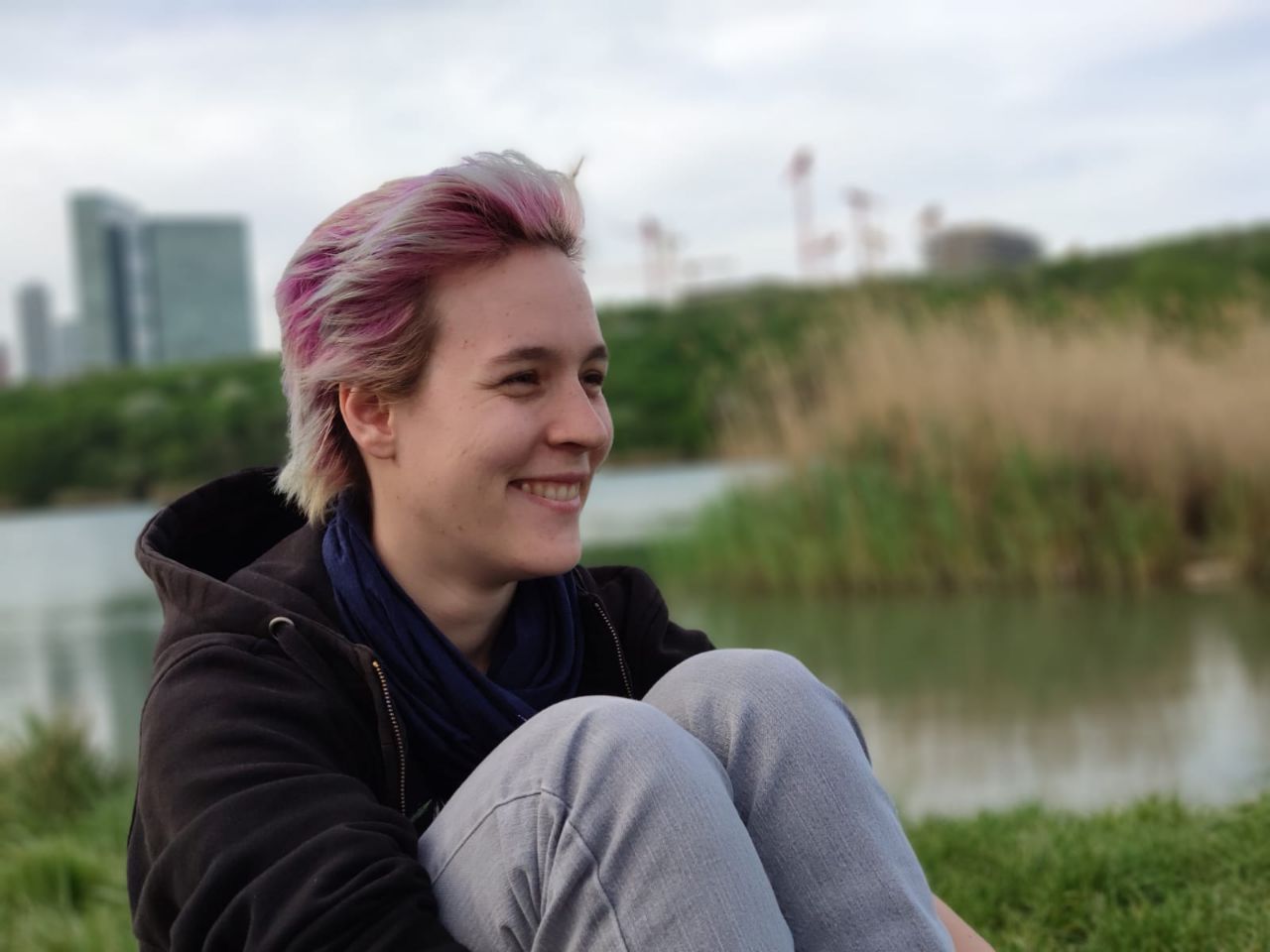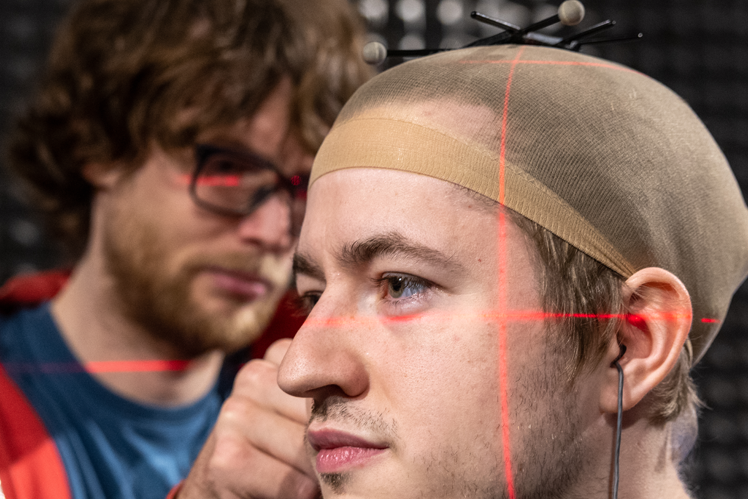In profile: Katharina Pollack
Meet Katharina (Kathi) Pollack, PhD student. Kathi works at the Acoustics Research Institute within the Austrian Academy of Sciences in Vienna, Austria. She is interested in spatial audio, games, and knitting.

Follow Kathi on Twitter @germknoedlspeck | More about Kathi and her work: www.oeaw.ac.at/en/ari/our-team/pollack-katharina
Kathi’s work and career
- What are you working on in SONICOM: in the past, now, or soon?
I work on making the access to personalised binaural audio easier for a wide audience! I have developed a parametric model to synthesize a variety of human ears such that no sophisticated input data is necessary to compute the acoustic filters that are highly individual.
- Did you have a role model that influenced your career pathway?
Definitely, my parents and my grandparents had and still have a great impact on my career pathway. The most important lesson I have learned from all of them is to be patient with oneself when learning new things and really trying to grasp underlying general mechanisms of specific problems.
- What is your scientific background?
I studied an inter-university programme called “electrical engineering & audio engineering” at the Technical University Graz and the University of Music and Performing Arts Graz in Austria. I followed up with the PhD programme “Sound and Music Computing” at the University of Music and Performing Arts Graz.
- How did you choose your field of study?
Growing up, I enjoyed learning and playing several instruments, such as piano, guitar, and e-bass. With all the technical inspiration and the passion to use my hands to create things, I wanted to dive deep into technical understanding of music production and recording without losing the musical roots.
- Why did you choose to become a scientist?
I guess it all started with organising a trip to a conference at the end of my undergraduate programme, together with colleagues and friends within the student section Graz of the Audio Engineering Society. Shortly after that, an internship at the Acoustics Research Institute in Vienna followed and I was hooked!
- What are your biggest achievements, and what are your biggest failures?
I think my biggest achievements happened all through my time at university. Very early on, I got involved in organising workshops and talks about topics and programmes that were just outside of our curriculum. With that, I hope I inspired many of my colleagues to get involved in various communities and finding their passion. As failures or let’s say “my progress areas”, I would consider not communicating my needs in a direct way and not distributing many tasks to others, but I have learned to overcome them by trying out working in various teams of various sizes and – by far the most important investment – by reflecting my own behaviour.
- What is a typical day like for you?
Even though there are emails and messages coming in at all times of the day, I try to balance the times when I want to be available for communication vs. when I do not want to be available so I can focus more highly on my work.
- What are the hardest parts related to your work?
I work in an interdisciplinary team of scientists from various fields, and most of the time is spent on agreeing on the meaning of the same technical terms that can mean different things, depending on the field.
- Did you ever doubt your abilities as a scientist? Why? How did you handle these situations/feelings?
Yes, I suffered from imposter syndrome heavily during my Master’s thesis. This may be rooted in the fact that I had many interests but felt confident in none of them, and that I was balancing my time between the two worlds of industry and academia. What helped me most was practising the identification of thoughts and emotions and a lot of self-reflection.
- What (or who) motivated you in difficult times?
Colleagues and friends around me and my now PhD supervisor.
- In ten years, what do you hope to have accomplished in terms of your work?
I want to have deepened the understanding of how humans are able to localise and have improved the world of personalised binaural audio by means of localisation.
- During your career, have you been specifically mentored or supported by someone?
I joined a mentoring programme of the Austrian Academy of Sciences and chose a mentor outside of my field of expertise, in order to get the most out of it and also broaden my horizon.
- What is the funniest or most memorable thing that has happened to you while working in science?
I meet the same people at the same or similar conferences every year, and even when I am seeing them only once or twice a year or every few years for only a few days, we develop the funniest inside jokes that spread over other laboratories and institutions.
Some musings on women in science
- How do you feel the current environment is for women in science?
I can only speak for my rather small bubble in Austria, but many systems of academia are still based on a patriarchal society. At this point in time, I’d wish for more public outreach of big academic institutions and an objective discussion about women in science.
- Where do you see women in science in 10 years’ time?
In German, we have the saying “large mills grind slowly but steadily”. I don’t think we will suddenly face big changes in the next decade. But when we look back to today, we will smile and be happy about how much we will have accomplished.
- What were the biggest obstacles you had to overcome? Did you ever have the impression that it would be easier/harder if you were male?
On a regular basis, I have to deal with a high amount of unconscious bias from male colleagues. This would definitely be easier if I were male.
- What kind of prejudices, if any, did you have to face? How did that make you feel? Were you able to overcome these?
I am a woman, therefore I must be …
… reacting emotionally.
… working in social sciences.
… unable to understand mathematics.
In case I identify that I am being prejudged, I use the opinion of others about me to my advantage in a discussion or situation.
- In your opinion, which changes, if any, are needed in the scientific system to engage more women in science and create more future female scientists?
Having career breaks (for example, when having children or caring for relatives) should not be displayed, advertised, and handled as a disadvantage in a career. Also, women need allies when it comes to prejudices.
- Do you have anything else that you’d like to say to young, female audiences?
If you have any doubts about you and your skills, do not let the doubts grow. Reach out to scientists if you have any questions, look for mentors early in your career and practice critical thinking. Invest in yourself, you are worth it.
Outside the lab
- Do you come from an academic family?
No.
- Besides your scientific interests, what are your personal interests?
I like making and recording music, programming, and playing games. I also like crafting and repairing, so I knit, crochet, and solder.
- Is it hard to manage both a career and private life? How do you manage both?
For me, it is not hard to manage. Both my workplace and partner are very flexible and support me.
- If you had the option to give advice to a younger version of yourself, what would that be?
I’d say two things: First, everybody uses water to cook and had to start at zero. Second, be persistent! Constant baby steps bring you faster and closer to your goals than large heaps.




